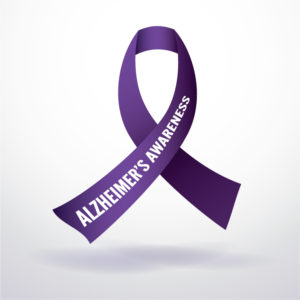Alzheimer’s Awareness Month at Abraham Family Medicine
 November is National Alzheimer’s Awareness Month. While it’s true that Alzheimer’s disease is mainly a concern for geriatric patients, the impact of the disease is far more wide-reaching. According to statistics collected by the Alzheimer’s Association, Alzheimer’s directly affects approximately 1 in every 2 families in America today.
November is National Alzheimer’s Awareness Month. While it’s true that Alzheimer’s disease is mainly a concern for geriatric patients, the impact of the disease is far more wide-reaching. According to statistics collected by the Alzheimer’s Association, Alzheimer’s directly affects approximately 1 in every 2 families in America today.
Alzheimer’s disease is the most common form of dementia. One of the best weapons against Alzheimer’s disease is knowledge. The more we know and understand about the disease, the better we can treat patients and try to limit its prevalence in the years to come. That’s why we’re writing today with some facts and statistics you may not be aware of. Hopefully our readers will share this information to help create a better understanding of this terrible disease.
Let us begin with some basic statistics.
- Alzheimer’s is a chronic condition that currently afflicts over 5 million Americans.
- Experts predict that figure could reach over 16 million by the year 2050.
- Of the more than 5 million Americans with Alzheimer’s, the vast majority (roughly 96%) are age 65 or older.
- Alzheimer’s is also a leading cause of death in America.
- The Alzheimer’s Association study showed that the disease is the sixth leading cause of death in the US and that a third of all senior citizens die with Alzheimer’s disease or another form of dementia.
A person’s physical health can affect their chances of developing Alzheimer’s. Conditions like heart disease, high blood pressure and diabetes can increase someone’s Alzheimer’s risk. Gender also plays a part. Women are almost twice as likely as men to be afflicted according to the U.S. Department of Health and Human Services. Symptoms of Alzheimer’s like brain shrinkage also tend to be more severe in women.
In order to help stave off Alzheimer’s as we age, experts recommend staying active, both physically and mentally. Keeping the brain sharp in old age through activities like reading, taking classes or playing a musical instrument can help lower the risk of Alzheimer’s. Regular social interaction is said to also be greatly beneficial. Additionally, daily exercise and a healthy diet can help keep the body vital and avoid some of the health conditions that are associated with Alzheimer’s.
Noticing signs of Alzheimer’s early and acting quickly can also be extremely helpful to a patient’s ability to treat and cope with their condition. Some patients in the early stages may be hesitant to seek medical attention due to a commonly-believed (though patently false) idea that memory loss is a natural part of aging. A person losing their sense of smell is another early sign of Alzheimer’s that should not be ignored.
Great awareness of Alzheimer’s in the years to come can hopefully lead to less prevalence, more effective treatments and a higher quality of life for those with the disease. Hopefully this helped increase you’re understanding and awareness of Alzheimer’s and the scope of its impact. If you have additional questions, please contact Abraham Family Medicine today or follow us on Facebook, Twitter and Google+.

